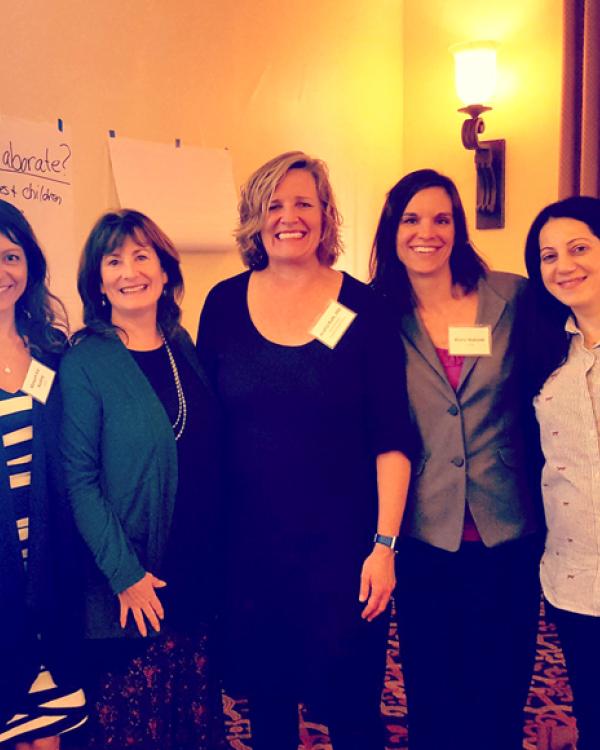
The Santa Barbara ACEs research team, Maryam Kia-Keating on the left
Maryam Kia-Keating, an Associate Professor of clinical psychology in UC Santa Barbara’s Department of Counseling, Clinical, and School Psychology, was contacted in the summer 2016 to collaborate in an innovative initiative focused on Adverse Childhood Experiences (ACEs). Kia-Keating says, “Right at the outset, I was so inspired to see the interdisciplinary group of change-makers who had gathered with a passion to address ACEs and improve the lives of children and families.”
Two physicians at Kaiser Permanente in San Diego conducted the ACEs study. After examining the records of over 17,000 adult patients, they found that a simple list of ten adversities experiences in childhood (ACEs) predicted many common chronic health conditions like cancer, heart disease, stroke, as well as mental health, alcoholism, suicide attempts, and even, overall life expectancy. The findings have been well described by Dr. Nadine Burke Harris, who is presenting her new book Healing the Long-Term Effects of Childhood Adversity at UCSB Arts & Lectures at Campbell Hall on April 16th, and has given a TED talk on the topic that has been viewed over 3.7 million times.
Dr. Burke Harris’ Arts & Lectures presentation—which is free and open to the public—is presented in association with the Santa Barbara Neighborhood Clinics (SBNC) and CALM (Child Abuse Listening Meditation), both partners in the initiative with Dr. Kia-Keating that has now burgeoned into a randomized controlled trial, testing three preventive interventions targeting children and families as soon as babies are born--the Santa Barbara Resiliency Project.
Dr. Andria Ruth (Pediatrician, SBNC) is at the helm of the medical setting where the preventive interventions for the Santa Barbara Resiliency Project are taking place. “Pediatricians now understand that adverse childhood experiences can have far-reaching effects on children’s physical and emotional health,” Ruth explains. “Many of our patients at the Santa Barbara Neighborhood Clinics have been exposed to these adverse experiences. With our project’s unique opportunity to focus on addressing adverse childhood experiences and promoting resilience as part of our well child visits, we are able to educate parents, support families and provide better care for our patients.”
Dr. Miya Barnett, Assistant Professor in the Department of Counseling, Clinical, and School Psychology who joins Kia-Keating on the research team, adds, “In order to really contribute to the larger scientific understanding of what to do for families for whom either parents or children have experiences ACEs, we needed to do a rigorous clinical trial, and we wanted to offer multiple levels of intervention, at the clinic, as well as in families’ homes.”
CALM provides the trauma-informed clinicians who meet with families who participate in the research study. “CALM is a committed and enthusiastic partner with the Santa Barbara Resiliency Project, which is an innovative project that uses an integrated approach in promoting health and behavioral wellness in the pediatric clinic,” Deborah Holmes (Chief Program Officer at CALM) highlights. “By routinely screening for ACEs at the Well Baby clinic, we are identifying adversity, promoting resilience, and ensuring that infants and their families get the guidance and support they need at the earliest opportunity.”
“We are so lucky that our local project has now become a pilot site for the National Pediatric Practice Community, an initiative that is connected to Dr. Burke Harris’ Center for Youth Wellness. We’re thrilled that she is sharing her work with the UCSB and Santa Barbara communities,” says Kia-Keating. “We’re really looking forward to collaborating with others at a national level. Our vision is to offer empirical support for integrated health and behavioral wellness in pediatric settings to support resilience in children and families, and ultimately, to prevent ACEs and their potential negative consequences.”
The Santa Barbara Resiliency Project has been made possible through the generous support of The Bower Foundation, Cottage Hospital, The Center for Youth Wellness (National Pediatric Practices Community on Adverse Childhood Experiences), First 5, the Health Resources and Services Administration (HRSA), the Mosher Foundation, the Outhwaite Foundation, the Priory Fund and UC Santa Barbara.